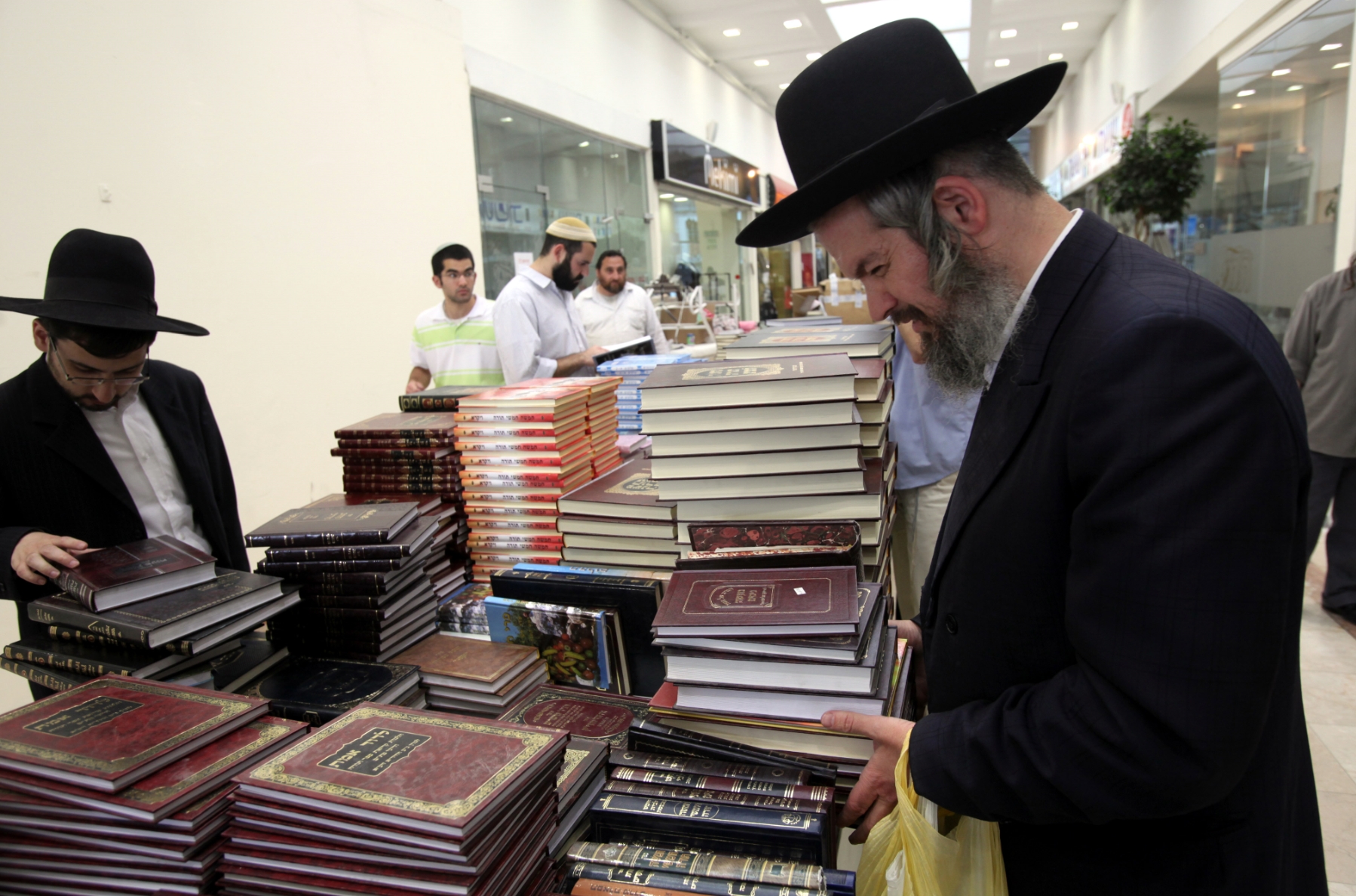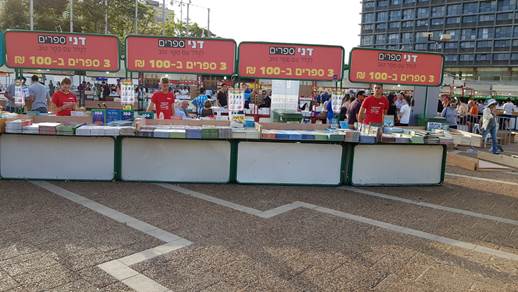Editor's Insight: The Rising Demand for Jewish Books Across Various Sectors
Eliran Navon, the chief editor of Alomot Publishing, highlights a surprising trend: 'Jewish books have become popular among all sectors.' How did this happen, and what are the unique features of the Book Week 2019?
 In circle: Eliran Navon (Photo: Tal Carmel)
In circle: Eliran Navon (Photo: Tal Carmel)Eliran Navon will spend the next two weeks traveling. From Haifa to Tel Aviv, then to Jerusalem, and later to Alon Shvut. Altogether, Navon will visit around sixty locations across the country each day. 'I am not going to see my kids during these two weeks,' he says with a smile, and for good reason. Those 60 points are the sixty book fairs of the Book Week, which started last Wednesday and will last until the next Saturday night. 'It will be a massive celebration. Every year it's a massive celebration.'
As befitting the 'People of the Book,' the Book Week, spanning over ten days, has become a kind of national holiday. No less than a million visitors are expected at fairs across Israel, with major fairs in Jerusalem, Tel Aviv, and Haifa. For some of the largest publishing houses, this accounts for about a quarter of their annual turnover in just over a week.
Navon is understandably excited about these days. After all, he is the chief editor of Alomot Publishing, a branch of Dani Books, which focuses on Jewish literature. He is the son of the founder and owner of Dani Books, Dani Fahima, and has lived the world of books since he was a child. However, for Navon, it is a double celebration. During the Book Week, he'll celebrate his 32nd birthday. 'Every year during the Book Week, I celebrate my birthday. It makes the Book Holiday even more special for me.'
Living with Texts
What is it like being the son of a publisher?
'It's growing into a world full of reading. You're swimming in endless content. It creates a lot of openness and variety at home since everyone is influenced by something different and in different ways. In our home, for instance, siblings vary in lifestyle - from modern Orthodox to ultra-Orthodox, yet we all sit together around the Shabbat table talking about texts and their impact on us.'
What kind of texts come up in your conversations?
'Everything. From how much children's books have influenced us to the deep impact of the writings of the Rambam, Rabbi Kook, the Lubavitcher Rebbe, and Rabbi Nachman. You sit around the table with the whole family discussing texts and how they shape your spiritual world. A publisher's home is a home where the entire year's cycle revolves around it. Our calendar is different from other people's. We live from Book Week to Book Week and from Chanukah to Chanukah. But during other holidays too, it's different from what everyone else knows. Essentially, it's living in a home where texts hold a place of honor. Texts in such a home receive a more precise and correct place. In short, we live around texts.'
I understand there's no chance to separate these worlds
'Clearly not. All discussions revolve around it. A popular debate in our home concerns whether a work by a certain rabbi would have had a mainstream platform in Judaism had it been written or presented differently. Take Rabbi Nachman, for example. Without the work that Rabbi Natan did on his texts, we might not have received his work at all. Essentially, Rabbi Natan is an outstanding publisher. It all stems from viewing things through this lens.'
Jewish Literature Breaks Through Sectoral Boundaries
It is no coincidence that the immediate examples Navon gives are from the Jewish bookcase. The brand he edits, "Alomot," specializes in Jewish writings. It is the second incarnation of the book brand "Alomot," which began as an independent publishing house decades ago. 'Originally, "Alomot" was a publisher specializing in reference books, children's books, and brochures. In the early 1990s, my father bought the distribution rights to all the publisher's books, including the rights to the name, and so "Alomot" ceased to exist. In 2013, we felt the field of Jewish books was blooming. It began with the books of Rebbetzin Yemima, and then came the book "Who Has Tasted Hungarian Wine," and in general, Rabbi Nachman's books became very sought after. We felt there was room to promote books in the field of Judaism, and we looked for an Israeli name.'
 (Illustration Photo: Flash 90)
(Illustration Photo: Flash 90)Why a specifically Israeli name?
'Because we understood that Jewish literature is no longer solely religious but something that has become an all-Israel heritage. So, we decided to revive the "Alomot" brand. We wanted a name that would be Israeli and contemporary, yet also have a Jewish touch. "Alomot" was perfect for this, and thus we brought it back to life after more than a decade of no publications. We created a new logo for it, rebranded it, and started publishing Jewish books.'
The first book published by Alomot was one that compiled sayings, phrases, and proverbs of Israel's greats throughout the ages, from the Rambam through the Baal Shem Tov to Rabbi Kook. Over time, the book evolved into a series called "Pure Sayings." 'It was the first series that blazed the trail. Once we launched it, people began asking what this publisher was. After all, it suddenly appeared after being absent from the market for a long time, and the idea excited people. Suddenly, more and more people wanted to be part of it, to enter some sort of partnership in the project. They felt there was a place here from which to break into the entire field of Jewish literature, and it really led to a lot of collaborations. One of these collaborations, with the Torah Institute in Or Etzion, gave birth to one of our most beloved series – "The Adventures of Rimmon Library." It's a story about two siblings who enter a library and travel back in time to different periods in Judaism. This series was very successful. Today, we release ten new books a year. We are the second largest publisher in Jewish books in the country, after Yedioth Books, which also has an interesting fact - their Jewish book sector is the most profitable of all the company's fields.'
Besides the "Pure Sayings" series and "The Rimmon Library," the publisher also releases a series called "Shabbat Table." Each book in the series collects interpretations from Israel's greats. Each book features the ideas of one rabbi, edited by Eliyahu Tayeb, who is behind "Who Has Tasted Hungarian Wine," and Moshe Rat. The first book in the series – "The Shabbat Table of Rabbi Nachman," was the best-selling book at the Hasidic Fair in its release year. This year, the third book in the series was released, this time from the teachings of Rabbi Natan, a disciple of Rabbi Nachman. The second book contains interpretations by the Lubavitcher Rebbe. Beyond these series, more books are being released, such as Rabbi Grossman's new book "Light of Shabbat," a new edition of all the Temple Institute's books, and a new book by Rebbetzin Ora Rivka Wenger, among many others. Probably the most prominent author of "Alomot" is Raanan Webber.
'Our success with Webber's books is unbelievable. His new book, "Surely There is Love," is set to be a bestseller at Steimatzky soon. From the outside, it's the most religious book you can imagine. It's a book that took one of the better-known stories of Rabbi Nachman, "The Lost Princess," and turned it into a kind of relationship therapy. It's going to be Steimatzky's flagship book. It's amazing to think that the flagship book of the State of Israel will be a 'religious' book. His previous book – "Being in Joy," was a bestseller for two months at Steimatzky. It's essential to understand that a bestseller is a book that the chain sees as having potential for the general public. There are five or six like this. Webber's book, "The Secret of the Good Point," is about to receive a Gold Book Award, meaning it sold more than twenty thousand copies. Very few authors in Israel can boast such an achievement. It's simply amazing,' says Navon.
'Once, people heard Rabbi Nachman and thought it was only for crazy people. Today, it's the most contemporary.'
But Webber's books are not the only ones enjoying broad public success. It turns out that this is a widespread phenomenon of the flourishing of Jewish literature. 'In the past, I used to present Jewish books to chains and suggest placing them at the checkout, and they would laugh at me. They said no way. Today, many Jewish books are at the forefront of bookstores. Once secular people heard Rabbi Nachman and thought it was only for crazy people dancing in the streets. Today, Rabbi Nachman is seen as something very contemporary and profound. And that is just one example.'
 (Illustration Photo: shutterstock)
(Illustration Photo: shutterstock)When did you notice this change in perception?
'We noticed the change around five years ago. As publishers, we identify "trends." That's how we identified that the wind was blowing towards Jewish books. Suddenly Rebbetzin Yemima and various rabbis sold many copies, even in the general market. Suddenly, the bestseller lists included books by Sivan Rahav Meir and her husband Yedidya Meir, and we identified a tremendous thirst in the field. We noticed that the intellectual religious audience, the one entering stores, craves such literature. And it's not just the religious. There's something in Israeli culture that weaves everything together. At the end of the day, there's a culture of Shabbat, where even the secular will pick up a book. It’s something that doesn't exist anywhere else. You can walk in Tel Aviv and see someone at the beach on Shabbat reading Rabbi Nachman's book, and when we saw that, we understood something was happening that couldn't be ignored.'
I try to understand from Navon whether there is a formula for a successful book, and I get a negative answer. 'You can't really know in advance what will succeed and what won't. Many times authors ask me how many copies I think their book will sell. Each time I give them the same answer, that if I had a clear formula, I would only publish bestsellers. But it doesn't work like that. The publishing field relies heavily on intuition and experience. What I do know to say is that often, a good combination on the periphery, that is, my ability as a publisher to choose the right people for a creator, from editors through proofreaders to producers, helps a lot. But that's not enough. There are many parameters that make a book successful. It starts with proper timing, good public relations, and things like that.
'We recently published a book by two journalists unrelated to Judaism, who took the biggest, funniest, silliest quotes from politicians over the past decade and compiled them into a book called "There Will Be Nothing." We released it close to the elections and it became a hit. We were sure it would only succeed within certain boundaries, because it's a slightly outdated style, but it was on the bestseller list for two months.'
Diversity and Innovation
Among the unique aspects of "Dani Books" publishing is the fact that they are located in the periphery and are closely tied to it. Not for nothing, the publishing house is responsible on behalf of the Writers' Association for the Book Week in various periphery cities. The publishing house itself is located in Kiryat Gat, far from the other big publishers in the country. 'All the publishers in Israel feel obligated to be in the central area. In any cultural field, the closer you are to the center, the more "in" you are. But we've always done everything from Kiryat Gat and managed to grow from it.'
 Book Week in the Periphery (Photo: Tal Carmel)
Book Week in the Periphery (Photo: Tal Carmel)Does this affect the nature of your work?
'Certainly. When I invite someone from the center and tell them to come to Kiryat Gat, I have to explain that with Highway 6 it's only about forty minutes, and they are usually surprised. It's something we struggle with in our daily life, and it's important to us. And it also has many other implications. It ties very much to the people you employ. It's not easy to find good editors who don't live in the Tel Aviv scene. It's complex, and I think our growth in recent years teaches that we're probably succeeding at it.'
Does the fact that you come from the periphery affect the content that is published through the publishing house?
'Absolutely. The influences on the writers are different from other places, and our customers are also different. We are the only publishing house in Israel today that works with all sectors. It's not easy to get a kosher certificate in the Haredi sector, it's something very few places can do. I have authors of all kinds, translated books, and Rabbi Grossman's books and others. This is something that doesn't exist anywhere else.'

